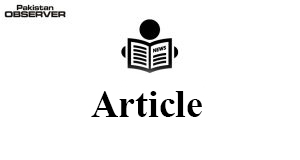Nazia Nazar
IN the first few days of August 2019, there were signs of something sinister afoot in Kashmir. Tens of thousands of additional Indian troops were deployed, a major Hindu pilgrimage was cancelled, schools and colleges were shut, tourists were ordered to leave, telephone and internet services were suspended and regional political leaders were placed under house arrest. The government then revoked Articles 370 and 35-A. The article 370 allowed the state a certain amount of autonomy – its own constitution, a separate flag and freedom to make laws. Article 35A of the constitution allowed the Jammu and Kashmir state’s legislature to define the state’s permanent residents and what distinguishes them. As a result, Jammu and Kashmir made its own rules relating to permanent residency, ownership of property and fundamental rights, and barred Indians from outside the state from purchasing property or settling there. But why Article 370 has been scrapped? Prime Minister Narendra Modi and the Hindu nationalist Bharatiya Janata Party had long opposed Article 370 and revoking it was in the party’s 2019 election manifesto. They also wanted to integrate Kashmir with India and put it on the same footing as the rest of India. After returning to power with a massive mandate in the April-May general elections, the government lost no time in acting on its pledge. Violence and discrimination targeting minorities based on religion and social status are among the significant human rights facing India, an official US report claimed in March 2020. The United Nations human rights office also voiced concern that the citizenship law was fundamentally discriminatory in nature and called for to review it. In India, several thousand people had gathered for a sit-in protest, whereas protest demonstrations were held in many states.
After revoking Articles 370 and 35-A of Indian Constitution that had given special status to Jammu and Kashmir, the final Assam citizens’ list was released, leaving out more than 1.9 million Muslims. After the abolition of Article 370 of the Constitution, 10 other states Arunachal Pradesh, Assam, Himachal Pradesh, Manipur, Meghalaya, Mizoram, Nagaland, Sikkim, Tripura and Uttarakhand that enjoy special category now distrust the Indian government because of Modi’s actions. It has to be mentioned that special category status was granted to them by the National Development Council on the recommendations of the Planning Commission to states that needed special consideration. But Modi is playing with fire, as some of the significant separatists movements in India include Naxalites or Maoists, which is second major freedom movement after IOK in India. Maoists inhabit an area known as the ‘Red Corridor’ that stretches from West Bengal to Karnataka state in the southwest. Assam had large influxes from the times of British colonial rule, and then around Bangladesh´s 1971 civil war when millions fled into India. For decades this made Assam a hotbed of inter-religious and ethnic tensions, adding to pressure for a lasting solution. Sporadic violence included the 1983 massacre of around 2,000 people. Security was beefed up in Assam ahead of the release of the NRC, with some 20,000 extra personnel brought in and gatherings banned in some locations. Only those who can prove that they or their forbearers were in India before 1971 could be included in the list. But it seems impossible in a region of high illiteracy where many lack documentation. Indian Prime Minister Narendra Modi´s Hindu nationalist Bharatiya Janata Party runs Assam, and critics are of the view that the NRC process reflects the BJP´s goal to serve Hindus only.
On 5 August 2019, Indian Union Home Minister Amit Shah announced that the Government of India revoked Article 370 of the Indian Constitution. Indian Government took away the special status of the state of Jammu and Kashmir (J&K) by modifying Article 370. Also, Rajya Sabha passed the Jammu and Kashmir Reorganization Bill – aimed at bifurcation of the state into two union territories – Jammu/Kashmir and Ladakh. Everyone was stunned by the Government’s action over Article 370 of the Indian Constitution. The question arises why India did this? It was said to be a consequence of Bharatia Janata Party’s (BJP’s) failure in their attempts to crush the freedom sentiment of Kashmiri people with the heavy armed presence of more than 700000 Indian troops. The BJP government carried out its long-standing pledge, which it had reiterated in its campaign of April-May 2019 General Elections. It was because of this promise that Modi Government dealt the opposition, which could be seen from the simple majority it got this time as compared to its previous coalition government. The BJP government wanted a strong united India according to its “racist ideology.” BJP’s extremist ideology was explained by the US Commission for International Religious Freedom’s (USCIRF) report which highlighted that the members of BJP have affiliations with the extremist groups. Report also stated that they instigated violence in the Indian Held Kashmir. Revocation of the major parts of Article 370 is just another step towards extremist ideology of RSS, VHP and BJP, which has created unrest in whole of India.
—The writer is freelance columnist, based in Finland.










